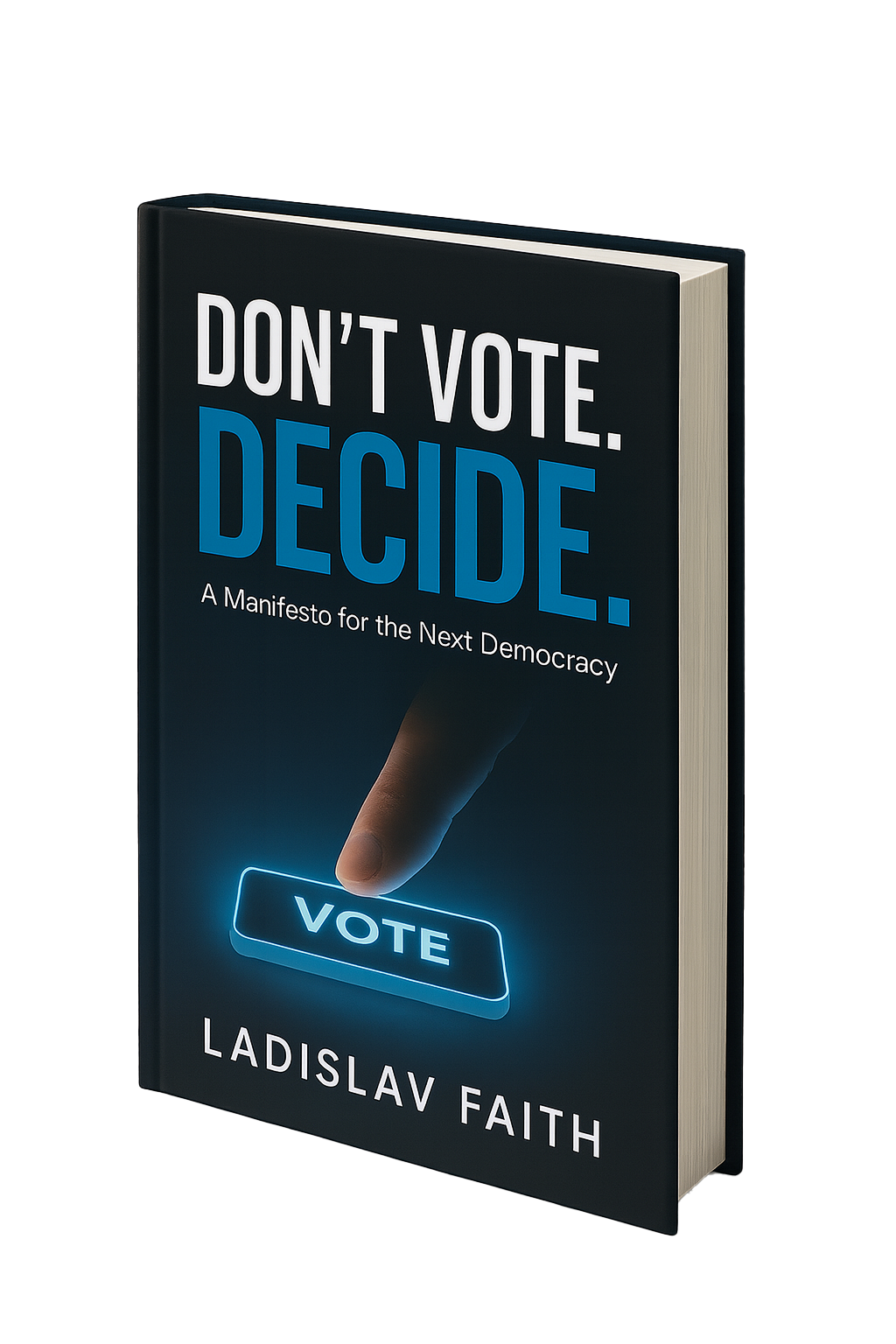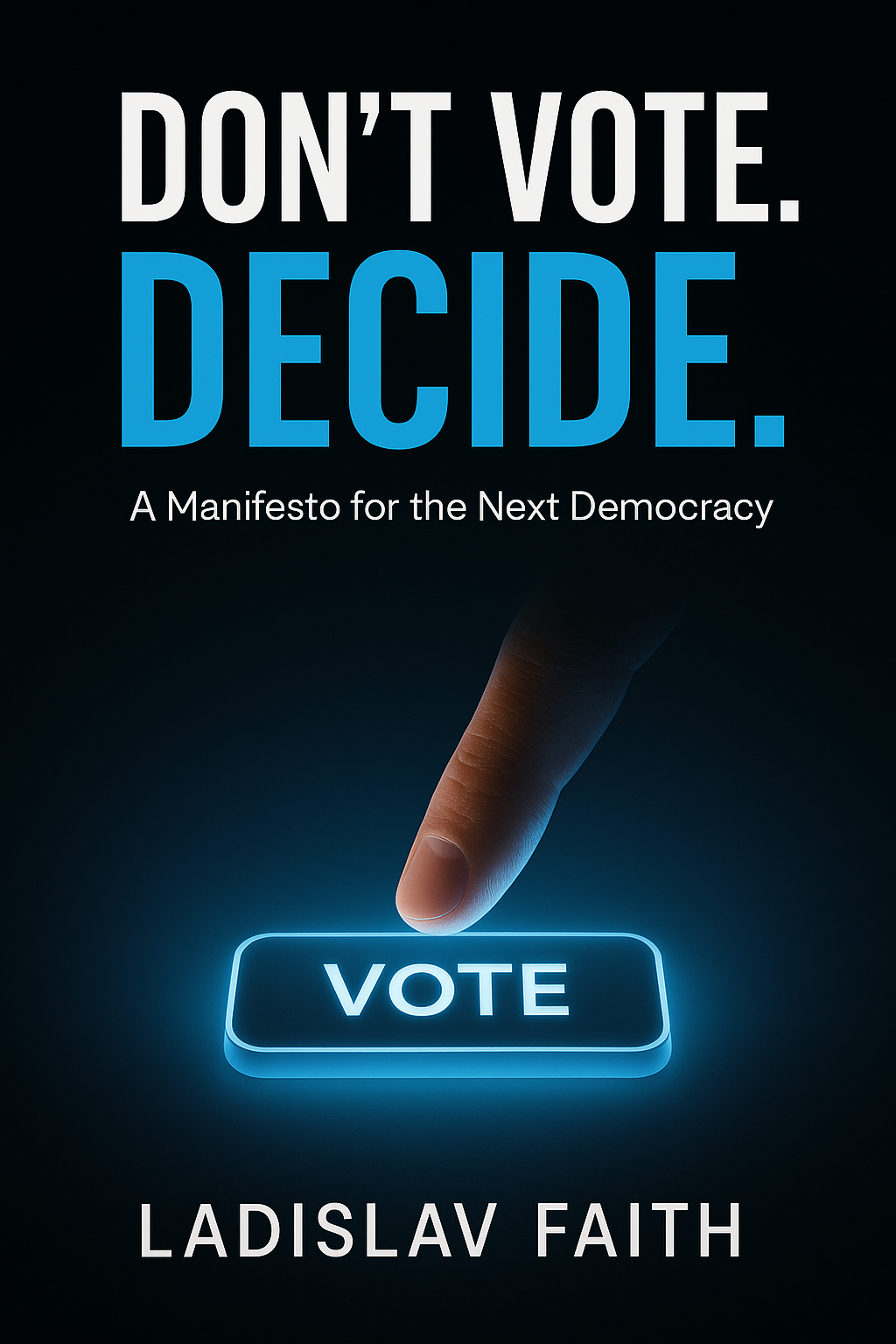
New York City, New York Nov 1, 2025 (Issuewire.com) - Democracy may soon face the most profound transformation in its history one that could make political parties obsolete.
In DONT VOTE. DECIDE., filmmaker Ladislav Faith presents a working blueprint: people vote directly in an app on high-impact issues, and artificial intelligence executes and verifies those decisions instantly, transparently, without rhetoric.
AI is not meant to govern. Its meant to serve.
(Chapter 6 Artificial Intelligence as a Civil Servant)
The book portrays AI as the states conscience accountant: a system that flags waste, compares costs to outcomes, and corrects distortions in real time.
This isnt rule by machines; its about making human decisions fast, auditable, and revisable.
Faith argues that if machines can optimize logistics and medicine, they can also help manage public will not by replacing it, but by processing it fairly and precisely.
Modern democracies, he writes, run on outdated operating systems systems designed for the 19th century, not for a connected world where information travels faster than policy.
People live in real time, but they still vote in intervals. Data updates daily; laws dont.
DONT VOTE. DECIDE. suggests that democracys real weakness is not corruption or ideology, but latency the time gap between collective awareness and collective action.
At the same time, the book argues that political parties were brilliant in the age of stagecoaches but in an era of real-time communication, theyre obsolete.
Political parties arent evil. Theyre just software that forgot to update.
(Chapter 3 Political Parties: A Temporary Fix That Rusted)
Faith envisions citizens using secure digital platforms to decide on budget priorities, social programs, or environmental action.
Each proposal would carry measurable data: cost, expected outcome, and long-term impact.
Once approved by majority, the system would trigger automated execution, with AI monitoring transparency and compliance at every step.
The goal is not to eliminate institutions, but to make them responsive turning politics into a continuous process instead of a distant ritual.
Its not about speed, but about precision and traceability.
More On Newsinterestcorp ::
- Mead Law Group LLP Named 2026 Best Law Firm Tier 1 in Construction Law and Litigation
- China Insulated Cooler Bags Factory Unveils Ultra-Durable Leak-Proof Designs for 2026
- Award-Winning "Pillow Armor" Wins Hearts at Asian International Film Festival, Sparks Global Distribution Interest
- Moshe Sheffi, Recognized by BestAgents.us as a 2025 Top Agent
- New Report Reveals the Most In-Demand Jobs Across All 36 States in Nigeria for 2025
The book also asks a broader question: if people can rate a driver or a movie in seconds, why cant they co-manage their government with similar immediacy?
Faiths answer is that they can once trust is rebuilt not around personalities, but around verifiable data and open systems.
Ultimately, DONT VOTE. DECIDE. frames a new social contract between citizens and technology one in which intelligence, both human and artificial, collaborates rather than competes.
Its a call to rethink democracy before it becomes a relic, and to design participation for a century that no longer waits four years to make a decision.
The question is no longer whether democracy can evolve but whether we will allow it to.
DONT VOTE. DECIDE. is not anti-democratic; its a user manual for democracys upgrade less promise, more delivery.
A vision where politics becomes operations and accountability returns to citizens, powered by technologies that already exist but remain politically unused.
Links:
Website: https://dontvotedecide.com
X (Twitter): https://x.com/LadislavFaith
Amazon: https://www.amazon.com/dp/B0FXJB9Q75
Media Contact:
Ladislav Faith
[email protected]


Media Contact
Ladislav Faith – Author & Documentary Filmmaker
New York, NY, USA
Source :Ladislav Faith / Don’t Vote Decide
This article was originally published by IssueWire. Read the original article here.
6 day's ago
6 day's ago

